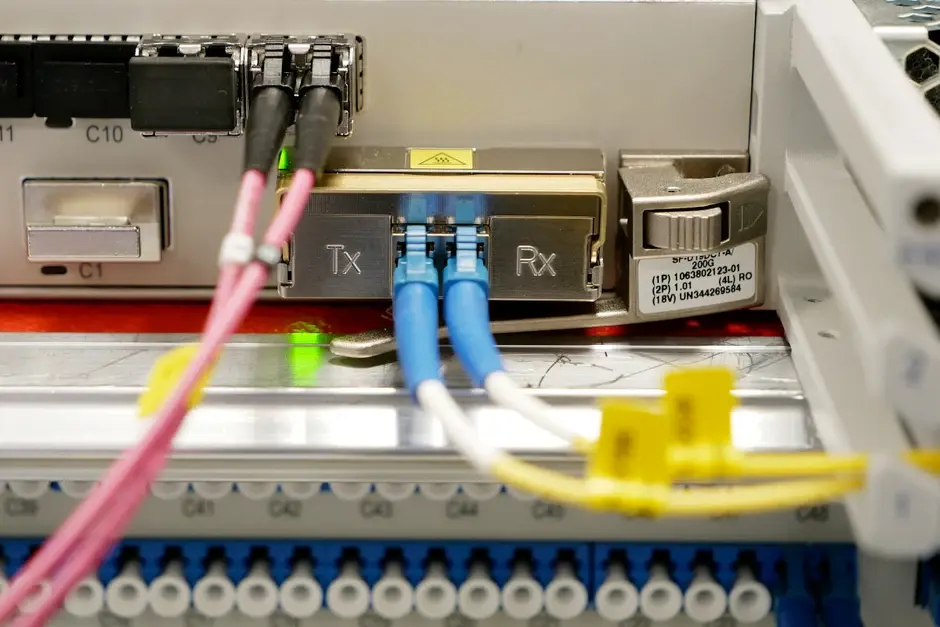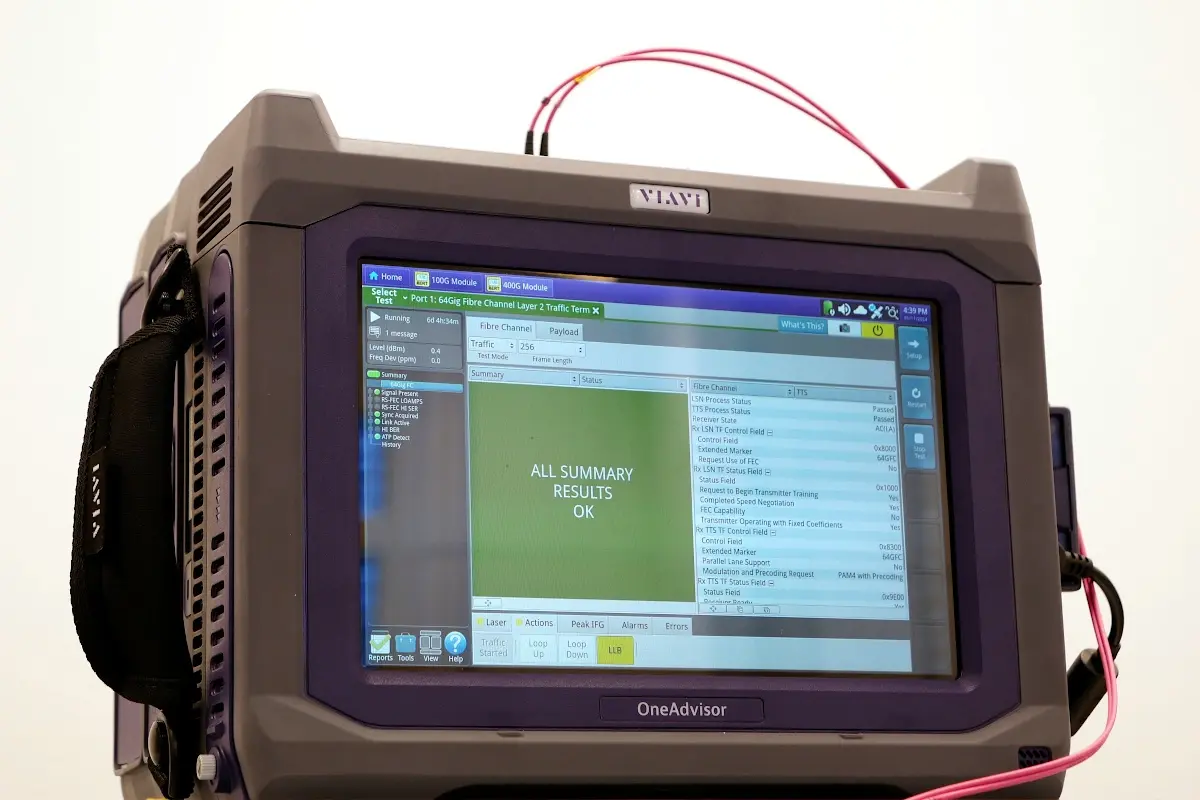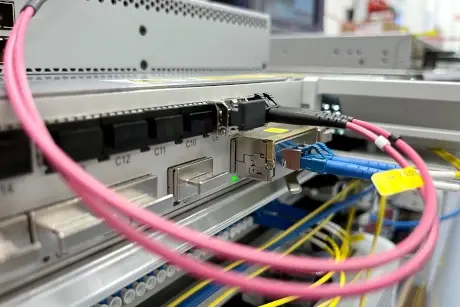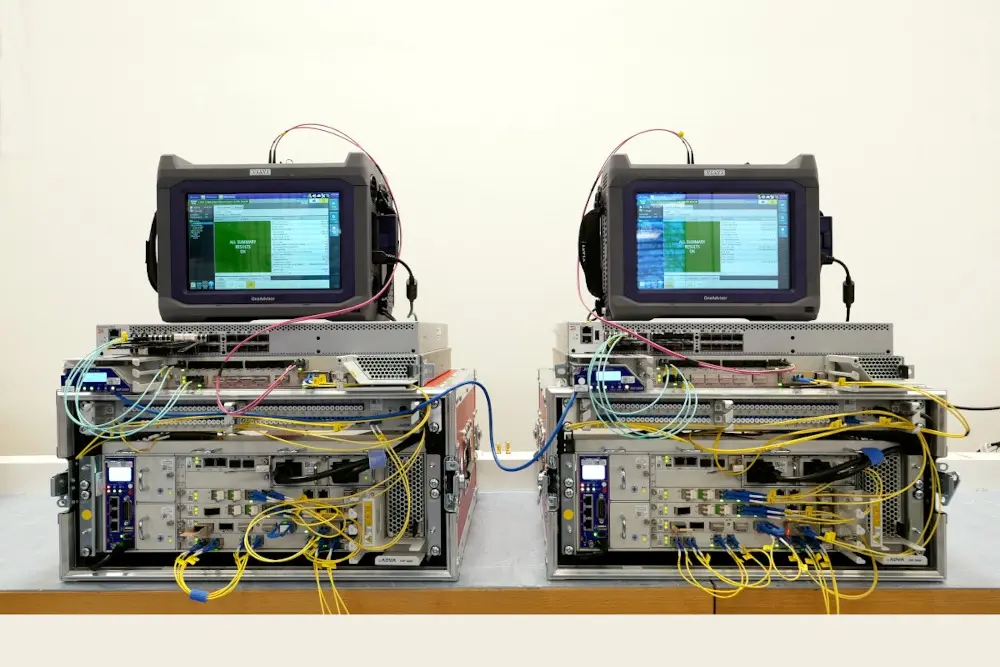New era with 64G Fibre Channel in the data centre
Data centre connections with even more bandwidth and security
- You are here
- 64G Fibre Channel
Maximum data volume and long-term quantum-safe connection
This muxponder takes the step forward with 64G FC
The new FSP 3000 S-FlexTM muxponder card from Adtran offers more data capacity than ever before and the certainty of being able to block future risks. It delivers 400G bandwidth, Fibre Channel 64G including ISL trunking and will ensure quantum-safe encryption for DWDM connections on layer 1 in future. At the same time, it is highly compatible with the existing systems in the data centres - top SAN performance included. This makes the 400G muxponder an investment for companies, authorities and critical infrastructure that will last far into the future.

Advantages of the new 400G Muxponder
- Smooth transmission of very large data volumes even over long DWDM distances - with more gigabits per wavelengthMaximum SAN performance with low latency
- High scalability of the systems
- Standardised security with AES 256 encryption
- Supports the systems of all major DCI and SAN providers
- investment protection for optical data centre connections thanks to future-oriented, quantum-safe solution
- Space-saving for racks and storage (only 2 slots)
Think quantum security now
It is only a matter of time before the first quantum computers are in circulation and fall into the hands of cyber criminals. FSP 3000 S-FlexTM is ready for the security threats of tomorrow and will soon be able to be supplemented by quantum-safe encryption (PQC) and quantum-safe key exchange (QKD) in DWDM systems. Companies in the defence and critical infrastructure sectors in particular need to consider this forward-looking solution today.
Would you like more details about the new 64G FC Muxponder?

400G + FC 64G: progressive and compatible at the same time
With a total capacity of 400 Gbit/s, the FSP 3000 S-FlexTM supports a wide range of DCI protocols, the most important of which are Fibre Channel and Ethernet. The card sets new standards for Fibre Channel: for the first time, Fibre Channel 64G can be called up without any problems. At the same time, ISL Trunking ensures that different FC runtimes are automatically equalised. This means that the bandwidths of the optical channels are better utilised and system failures are prevented.
The solution is also compatible with mainframe environments, which are still used by banks and insurance companies in particular - e.g. with the IBM Z-Series protocols. At the same time, it provides highly available connections to the cloud. This makes the new 400G muxponder currently the only card on the market that manages this balancing act.
The new Muxponder 64G FC from Adtran at a glance:
- 400G Muxponder
- Fibre Channel: 16G, 32G and 64G
- Support for ISL Trunking
- Ethernet: 1GbE, 10GbE and 100 GbE
- IBM mainframe certified (RoCE, CELR)
- Multi-rate / multi-service
- AES-256 encryption
- Quantum secure in later releases thanks to QKD (Quantum Key Distribution) and PQC (Post Quantum Cryptography)

Live demo: Data centre coupling via DWDM with FSP 3000 S-FlexTM
We have already successfully implemented the first customer projects with the 64G Fibre Channel card. And for those interested in the new Muxponder, we have set up a live demo in our laboratory in which two "data centres" are connected to each other. In addition to the FSP 3000-SFlexTM from Adtran, the measuring devices from our partner VIAVI are also integrated there, with which the performance of the FC 64G connections can be reliably tested - this test option is currently an absolute novelty on the market.
Come along and let us show you and explain the performance of the 400G muxponder for Fibre Channel 64G in our engineering lab in Langen. Or we can pack everything up and come to you!
Arrange your appointment for a live demo!

Fibre Channel still in demand
Although the number of FC implementations has fallen slightly in recent years, Fibre Channel is still very popular. The protocol is still the first choice, particularly for business-critical applications that rely on maximum performance, security and minimum latency. It is widely used in enterprise storage solutions, for which it was specially developed, as well as in scientific research and the financial sector.
The upgrade from 32G to 64G brings double the power to meet growing capacity requirements. 64G Fibre Channel builds on the successes of previous generations of Fibre Channel technology and offers several advantages over other storage networking technologies such as iSCSI and InfiniBand. These include the ability to be used over long distances and minimal latency.
Get started with the new 64G FC Muxponder now
Just ask us - we will be happy to inform you!